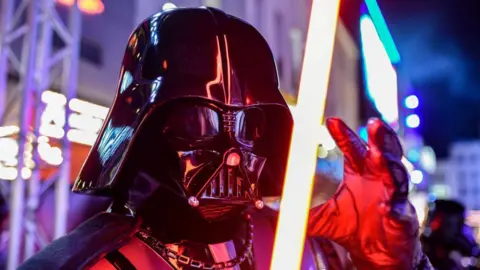In a significant development in the realm of intellectual property and technology, two entertainment behemoths, Disney and Universal Studios, have taken legal action against the artificial intelligence firm Midjourney. This lawsuit centers around Midjourney’s image generation tool, which the Hollywood giants assert is a “bottomless pit of plagiarism.” They contend that the AI technology indiscriminately replicates visual representations of a plethora of iconic characters, including Darth Vader from the Star Wars saga, Elsa from Disney’s Frozen, and the beloved Minions from Despicable Me.
The controversy highlights an ongoing tension within the entertainment industry concerning the use of AI technologies. While many in Hollywood are eager to harness the power of artificial intelligence for creative pursuits, there is a profound anxiety that their original works could be appropriated without acknowledgment or compensation. Midjourney’s platform operates by generating images based solely on user-provided text prompts, adding to the complexity of potential copyright infringement issues.
The legal complaint, lodged in a federal district court in Los Angeles, provides detailed instances where Midjourney’s algorithms produce images that bear a striking resemblance to recognizable characters. Among the examples cited are Disney’s iconic figures such as Yoda from Star Wars and superheroes from the Marvel Comics franchise including Spiderman, Iron Man, and the Hulk. According to Disney’s chief legal officer, Horacio Gutierrez, the potential of AI as a responsible tool to enhance human creativity is acknowledged; however, he firmly emphasized that piracy remains piracy, regardless of the perpetrators’ technological advancements.
Furthermore, the lawsuit delineates the financial backdrop of Midjourney, noting that the AI company reportedly amassed around $300 million in revenue in the previous year alone and is contemplating launching a video service imminently. The discussions surrounding the suit also raise essential considerations about the nature of creativity and copyright. Law professor Shubha Ghosh remarked that many of the images created by Midjourney appear merely as copies of well-established characters, often placed in novel settings or backgrounds, without significant transformation that might warrant them unique under copyright laws.
Several legal experts weigh in on the complexities of this case. Randy McCarthy from the IP Law Group at Hall Estill pointed out the myriad of legal factors at play, emphasizing that each litigation carries its own challenges. He noted that the outcome of this case would hinge upon various legal elements including Midjourney’s terms of service and the existing frameworks for fair use under copyright law. As it stands, Midjourney has yet to publicly comment on the litigation or the claims laid against it.
Founded by David Holz, a notable figure in the tech industry with a background in creating innovative sensor technologies through his former venture Leap Motion, Midjourney operates out of San Francisco. The company describes itself as an “independent research lab” with a compact team comprising fewer than a dozen staff members. Interestingly, it boasts a roster of advisors which includes high-profile names such as Nat Friedman, the former CEO of GitHub, and Philip Rosedale, the creator of the virtual world Second Life.
Amidst the ongoing legal discussions, the film and television industry finds itself at a crossroads regarding AI technology. Just two years prior, the industry faced considerable disruptions due to strikes from writers and actors advocating for protections against the evolving technological landscape. Recently, however, AI has begun to carve a niche for itself in creative fields such as television, film, and video gaming. The application of AI in films has expanded, with recent Oscar contenders employing technology to modify actors’ voices, alongside notable efforts to implement de-aging effects for legacy actors like Tom Hanks and Harrison Ford.
In conclusion, the lawsuit against Midjourney underscores the intricate interplay between technological advancement and creative rights. As the world grapples with how to navigate copyright in the age of AI, the outcome of this case might set significant precedents for future interactions between intellectual property law and artificial intelligence in the entertainment industry.



